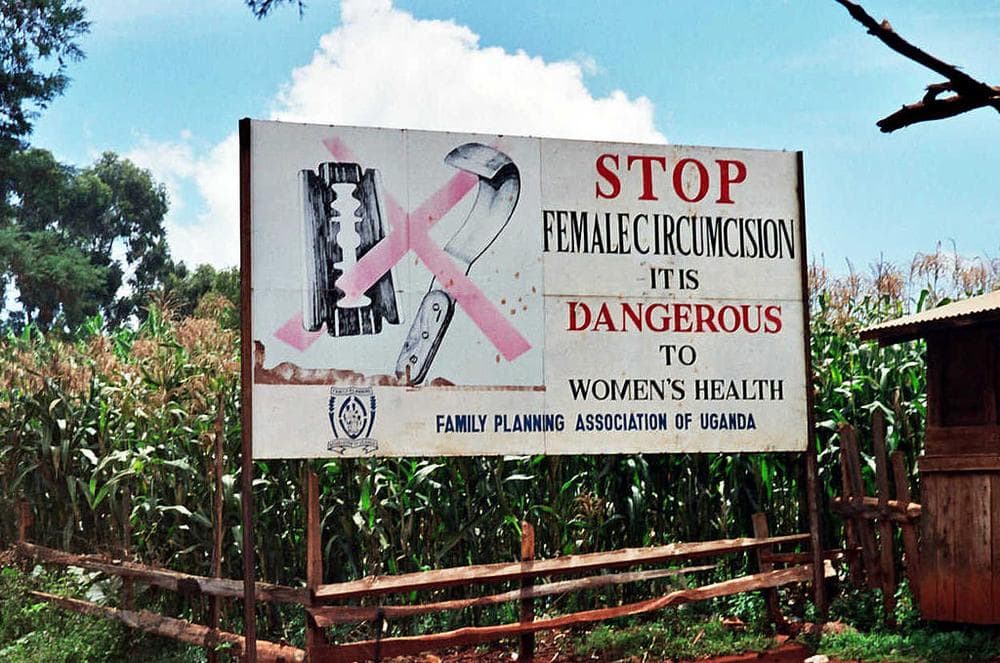Advertisement
In Defense Of Female Circumcision? Panel Presents Seven Facts

What? How can there be counter-arguments? Isn't the genital cutting performed on girls in Africa the very definition of barbaric?
Not according to a provocative set of articles just out from The Hastings Center, the bio-ethics think tank. They argue that Western media have mis-portrayed genital surgery as worse than it is in a variety of ways. From the press release:
Despite widespread condemnation of female genital surgeries as a form of mutilation and a violation of human rights, an international advisory group argues that the practice is poorly understood and unfairly characterized. In a public policy statement in the Hastings Center Report, the Public Policy Advisory Network on Female Genital Surgeries in Africa, a group that includes doctors, anthropologists, legal scholars, and feminists, argues that media coverage of the practice is hyperbolic and one sided, "painting the now familiar portrait of African female genital surgeries as savage, horrifying, harmful, misogynist, abusive, and socially unjust."
The advisory network's statement takes no position on whether the practice should continue. It aims to "move the coverage of the topic from an over-heated, ideologically charged, and one-sided story about 'mutilation,' morbidity, and patriarchal oppression to a real, evidence-based policy debate governed by the standards of critical reason and fact checking."
...Female genital surgery – a neutral term used by the advisory network instead of other terms, such as female genital cutting and female circumcision – has been condemned as a violation of the human rights of girls and women by a wide range of experts and organizations, including the World Health Organization and the United Nations. In several African countries, including Egypt, Guinea, Sierra Leone, and Somalia, more than 90 percent of women ages 15 to 49 have undergone such surgeries.
In its statement, the advisory network focuses mainly on two types of female genital surgery, which they state comprise 90 percent of procedures in Africa. These practices involve reducing the clitoral hood and tissue and reducing or eliminating the labia and the clitoris. A third type, referred to as infibulation or sealing, involves narrowing the vaginal opening with stitches or some other sealing method.
The authors put forth seven facts that they hope will change the scope of media coverage and lead to a better understanding of the cultural complexities underlying female genital cutting:
♠ Medical research has found that a high percentage of women who have had genital surgery "have rich sexual lives, including desire, arousal, orgasm, and satisfaction, and their frequency of sexual activity is not reduced."
♠ Reproductive health and medical complications linked to female genital surgery happen infrequently.
♠ Those who value female genital surgery view it as aesthetic enhancement, not mutilation.
♠ In almost all societies where female genital surgery is performed, male genital surgery also takes place. Broadly speaking, then, such societies "are not singling out females as targets of punishment, sexual deprivation, or humiliation."
♠ The link between patriarchy and female genital surgery is unfounded. Almost no patriarchal societies adhere to the practice and, at the same time, the practice is not customary in the world's most sexually restrictive societies.♠ Women manage and control female genital surgery in Africa and the practice "should not be blamed on men or on patriarchy." Ironically, the authors contend, groups that fight against female genital surgery weaken the power of women.
♠ An influential WHO study about the "deadly consequences" of female genital surgery is the subject of criticism that has not been adequately publicized. The reported evidence does not support sensational media claims about female genital surgery as a cause of perinatal and maternal mortality during birth.
And the policy implications:
♠ The media, activists and policy-makers must "cease using violent and preemptive rhetoric" that paints a sensational image of African parents mutilating their daughters and damaging their reproductive and sexual health.
♠ It should be acknowledged that female genital surgery is not unique to African women; the authors liken it to "genital piercings on college campuses" and "vaginal rejuvenations requested by some Western women."
♠ Advocates fighting for safe, hospital-based female genital surgery should be given a voice in public policy forums.
♠ "Zero tolerance" slogans promoted by anti-mutilation groups are counterproductive. Not only do they limit thoughtful, respectful dialogue, but they can make genital surgery more dangerous by driving the practice underground.
♠ Legislation and regulations that criminalize female genital surgery for adult women are discriminatory, because they deny women's autonomy "to choose what makes them happy with their own bodies."
♠ Studies of genital surgery should be multidisciplinary, and there should be support for a network linking researchers and advocates who have diverse points of view.
♠ Women and girls who have undergone genital surgery as children and are now living in countries where the practice is nonexistent or illegal should not be subjected to discourse that stigmatizes them or teaches them to expect sexual dysfunction. Such discourse "may provoke what could be called 'psychological mutilation,'" potentially compromising the development of a normal and healthy psychosexual life.While agreeing with the international network's call for accurate information about female genital surgery and its criticisms of inflammatory language, three commentaries disagree with the policy advisory statement.
Readers? The full set of articles is here, including the three dissenting commentaries.
This program aired on November 14, 2012. The audio for this program is not available.
